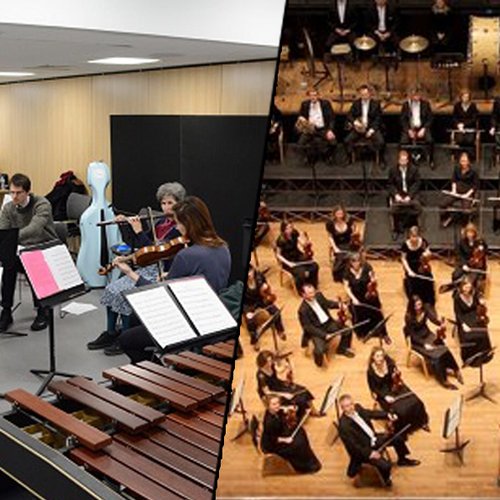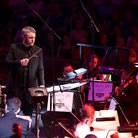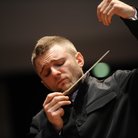From The Back Desk - David Daly, Bournemouth Symphony Orchestra
What's it like to be in Classic FM's Orchestra in the South of England? We chatted to double bassist David Daly to find out - apparently it involves egg on your chin and squeaky stools.
Name: David Daly
Instrument: Double Bass
Ensemble: Bournemouth Symphony Orchestra
Why did you decide to become a musician?
I didn't really - my dad was a clarinettist and he decided for me that I would be too. However I kept fainting at the effort of blowing the clarinet so that came to nothing. Then one day a colleague gave him a double bass for nothing and so here I am today!
What's the one performance from your career that sticks in your mind?
Actually last week's performance of Shostakovich's Symphony No. 14 was an incredible experience. I had to play various solos on the very bottom register of the bass which is unheard of. Our current principal conductor Kirill Karabits is amazing in performance and with the Beethoven symphony series we completed last season I felt perhaps for the first time that I had truly touched on what that extraordinary music is all about.
What's the most embarrassing thing that's happened to you on stage?
Not quite on the BSO concert platform, but I was once invited to give a bass demonstration and performance at a girls' school. Just as I started I realised I had egg on my chin and subsequently had to do the entire performance making sure I stayed right behind the bass the whole time - it was a very uncomfortable hour!
If you could work with one musician, living or dead, who would it be and why?
I'd love to go back a couple of hundred years and play alongside the great bassist Domenico Dragonetti. He was friends with Beethoven and on one occasion played one of Beethoven's cello sonatas on the double bass with Beethoven accompanying him on the piano. At the conclusion Beethoven jumped up and hugged both Dragonetti and his bass! It is suggested that because of this performance Beethoven realised the much greater technical possibilities of the double bass and so the double bass parts in his symphonies developed in such an independent and challenging fashion. When Beethoven's ninth symphony was premiered in London, Dragonetti had to be drafted in to play principal bass as the other bassists considered the part impossible and for which he received an enormous fee.
In concert, have you ever thought, "I can't actually play this bit very well, I'm going to mime and hope no-one notices"?
As a double bassist you are well used to 'not being noticed'. We are like the foundation of a house, essential to the edifice but not visible. No one ever pulls up in front of a beautiful building and comments 'what a beautiful foundation', so we get used to being ignored and get quite chuffed when a conductor does take a particular interest in the bass part. As for 'blagging it' we can sometimes get bass parts which at the tempo indicated would be very difficult to play every note clearly (think of 'The Flight of the Bumblebee' played in the low register of the double bass!) and if we were to try to do so it would not create the effect the composer intended. Composers can seek to create a backdrop of sound, wallpaper if you like, over which they will have melodic music. We sometimes can have the job of doing the wallpapering.
Could you give us an example of the downside of the profession, something that the average concert-goer might not know about?
When my children were young I used to miss not seeing them after breakfast. Most of the week I would be leaving around midday and back at not much before midnight. I do sometimes wonder though, as we play a wonderful concert and look like we are dressed for dinner at Downton Abbey, if all the audience realise that's where the glamour mostly ends! Backstage areas can be cramped and even sometimes cold before a concert and there can be a long drive home after the gig. Even so, I think most of us would not swap it for anything.
Does the touring lifestyle bring out rock star behaviour in the orchestra?
If it does I will have missed out on it! On tour I like nothing more than a nice meal after the show, perhaps a stop at the hotel bar to unwind but then a good night's sleep. I also like to get up reasonably early when touring as usually that's the only opportunity we will get to explore the new places visited.
Have you witnessed any serious diva strops in your time as a musician?
Everyone loves a good diva strop! I was sort of involved in one some years ago: I was doing TV sessions and sitting on stage behind the presenter. He was wonderfully warm, calm and happily chatting to the camera. I unfortunately had a bass stool which creaked every time I moved and when it did once too often the lovely avuncular presenter suddenly swung around becoming a ferocious dragon swearing at whoever was making "that damned racket"! We all froze and he turned back to the camera again, instantly becoming Mr Nice again. Needless to say I didn't move for the rest of the session.
What's the biggest challenge facing musicians like you these days?
Personally I think the longer you are a musician the greater the temptation to get blasé about your standards and to guard against this I like to do occasional recitals and chamber music. As symphonic musicians we also need to remember that though we may be playing a piece for the fiftieth time there will almost certainly be people listening for the first time for whom this performance might be one of the most moving experiences they will ever have had. I think also we have yet to work out how exactly the symphony orchestra finds its place in the 21st century. We are well and truly in the iPod era and never before has so much music been so easily available and yet a genuine musical experience I think has to be a shared one to be truly meaningful and that is where the concert hall comes into its own. I like what Sir Simon Rattle said: "There is great strength in the concept of people coming together with time to listen".
What's the best thing about being a musician?
What I will do in a moment: pick up this beautiful instrument and draw the bow across it and then even in the silence of my own studio start to make sounds that words cannot express, just as I have been doing since the age of 12.
David Mellor's show this Sunday is a Bournemouth Symphony Orchestra special to celebrate the new partnership between Classic FM and the BSO - more information here.







